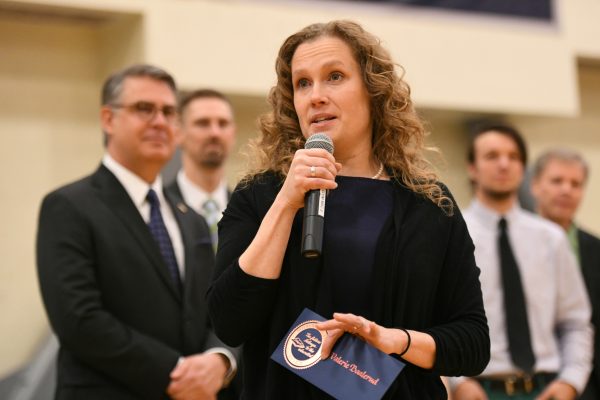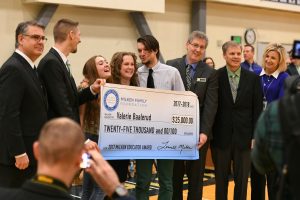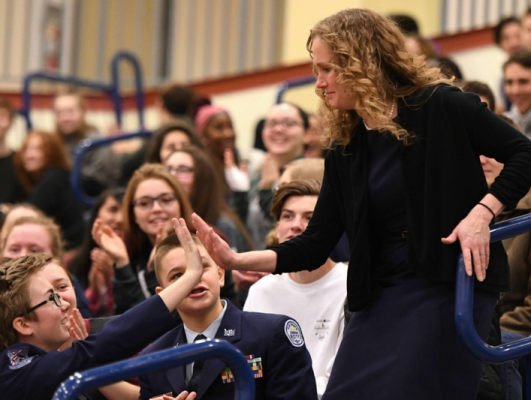UAA alumna Valerie Baalerud honored with Milken Educator Award
by Jess |
The morning she won a prestigious Milken Educator Award at a surprise school assembly, UAA alumna Valerie Baalerud was sitting in the top row of bleachers, keeping an eye on some rowdy underclassman.
She spotted what appeared to be an older student with a cell phone. She tapped him on the shoulder. "Oh," she said surprised, "I'm really sorry. We don't have cell phones during assembly, but I see you are an adult."
Actually, he was a planted photographer.

Valerie Baalerud accepts her Milken Educator Award at a surprise assembly at Eagle River High School on Feb. 1, 2018. (Photo courtesy of the Milken Family Foundation)
Minutes later, when Alaska Commissioner of Education Dr. Michael Johnson announced her name to the Eagle River High School community, the man whipped around with his phone and snapped Baalerud's startled face. "I was just sort of blank," she remembered, shaking her head in disbelief.
With just seven years of teaching - mostly history and some economics - under her belt, all of it in Eagle River, Baalerud has garnered one of teaching's most prestigious early-to-mid-career honors. Milken recipients are chosen for their educational talent and accomplishments, potential for professional and policy leadership, and an engaging and inspiring presence. She was this year's only Alaskan, and one of 44 winners named around the nation. The Milken Foundation has been delivering these awards for 30 years, including a $25,000 check to each recipient.
The press release was full of accolades, reporting that Baalerud "treated her students like historians, demanding rigorous thought and analysis...helping them connect the dots between historical events and current approaches to geopolitical issues.
"She goes out of her way to infuse character education into her curriculum, harnessing students' curiosity, exposing them to different points of view and challenging them to advocate for their beliefs."
Baalerud is also "all in." She's coached Model United Nations, flag football and track, and advised student government. She also coaches Drama, Debate and Forensics (DDF) and produces some of the most competitive debaters in the district. Seniors invited her to give their commencement address after only her third year at the school.
A pragmatic approach
Her career and personal story were much less rosy when, facing divorce from her military spouse and raising three children as a single mom, she walked into a counselor's office on JBER in 2009 and asked for the fastest route to becoming a school teacher. She found it at UAA.
"UAA has a great program," she said. "And it was the program I needed when I got there. It was accessible. The times worked out well for my scheduling. I always felt like I was well supported by the staff ... I was going through the beginnings of a divorce at that time, and they were personally supportive."
Her mom, someone she calls her "biggest fan," moved to Alaska to help care for her children while she studied. She can remember several UAA faculty who made an impact: Paul Dunscomb in history ("He brings a unique perspective to the department. He is a great guy."); in her master's program, she remembers being strongly mentored by Janet Steinhauser and Mary Bristol. Steinhauser even became her long-term substitute at Eagle River during a maternity leave.
Life's twists and turns
Baalerud grew up in a town of about 60 people in upstate Pennsylvania. "There were more cows than people," she said. She's blunt about her memories of that time and place.
"I had a troubled home life growing up. We didn't have money. I wasn't the smartest student in the class. I graduated in the top 10 percent, but I joked that I was the dumbest of the smart kids."
She did whatever she could to get out of that small town. "I was the student government president. I was in the marching band. I was in everything that would add something to my college resume to get me out of that little town."
And she did get out, to the University of Denver and the start of a communications degree. But a visit home resulted in an unexpected pregnancy. She dropped out of school and married a local boy. He joined the military at a relatively quiet time. But then 9/11 happened.
Her first husband served seven deployments in 10 years. "It is a marriage destroyer to constantly have a spouse gone," she said simply. "And it made me realize that I needed a much more portable career. That's what got me to look at teaching. I wasn't an 18-year-old college student who had time to waste and money to spare. I needed to be practical about the situation."
Off she went to UAA, earning a bachelor's in history, a minor in economics, and her master's in teaching - all in record time. She finished in 2011, with fingers crossed.
"I genuinely didn't know if I would like teaching," she said. "It wasn't until my internship here at Eagle River seven years ago that I walked up in front of the classroom for the first time. I was surprised at how NOT nervous I was. It felt perfectly natural. It fit like a glove."
The other surprise was falling in love again. Her husband, Andrew, teaches math and French at Eagle River High. Some of her children attend here, too: Kali, at 17, is the student representative on the Anchorage School Board. Sadie is a sophomore, and Jacey is in 6th grade at Alpenglow. Her youngest little boy, Odin, age 2, is in daycare.
Why history?
Baalerud talks about not always seeing eye to eye with her father. He was a special education teacher. That didn't turn her toward education, though. To her, it was just the job he had. One thing they often did together, something they both really enjoyed, was taking long walks in the country. They looked for old house foundations, and pondered who had once lived there, what their lives had been like.
"I just found that fascinating," Baalerud said. "What was the history of these people? What happened on this land? Who else walked on this same place that I am walking now." It got her hooked on history, if not necessarily teaching.
But the teaching bug bit hard as she gained experience at Eagle River High School. She started coaching DDF. It had been her saving grace in high school, the place where everyone was welcomed - the football jock, the cheerleader, the nerdiest nerd or the band geek. "It was like watching different parts of my own personality all come together," she said. "Everybody loved each other and protected each other."
An experience with high needs students that first year cemented her teaching commitment. It was world history, a class of about 30 kids. Ten or 11 of them were on individual education plans, and four of those were very high needs.
"I put them in four different corners of the room so I could study them individually and try and get some time with them," she said. As the year progressed, they gradually drifted away from her class. Toward the end of the year, when the last of the four departed, "I was heartbroken. I had tried so hard to hang on to those kids." She later learned that her class was the last one the fourth student gave up, having dropped out of every other class long before hers.
"There was sadness," she remembered, "OK, it wasn't working. But I was not a failed teacher, it just was not the best learning environment for them."
Her difficult upbringing made her especially alert to the quiet student. "I am really able to connect with the kid that I can see out of the corner of my eye, the kid who has some extra things going on ... I want to make sure their value is recognized just as much as anyone else's."
Finding a voice in education policy
As a member of the Milken family of educators, Baalerud joins a vigorous network of teaching professionals across the country. She's already attended a conference and listened to education strategies developed across the country. She calls herself "politically minded although not politically active." She understands that her Milken award may give her a fresh voice on education issues, and she plans to use it.

Surrounded by daughter Kari, left, and her husband, Andrew, right, Valerie Baalerud accepts the Milken $25,000 check. (Photo courtesy of the Milken Family Foundation)
What about the state of education in Alaska and in America today, with declining funding, larger class sizes, and social problems washing into classrooms?
Baalerud is philosophical: "I don't know what the solution is as a whole. There are so many societal issues we need to focus on first. We aren't going to be able to fix education unless we fix poverty. And unless we fix drug abuse. And unless we fix some of those other underlying problems first. Each state has to get its own house in order."
She's studied the poor side effects of heavy social media and cell phone use, and says schools need to do more to help students cope. She's worked on raising awareness of its impact among students and implementing a limiting policy at her school.
Significantly, she is adamant that education needs to be well funded. "We know that the one thing in a classroom that can make or break a student is a good teacher," she said. "It's not that difficult to fund. We aren't that expensive. Nobody goes into education to make money."
Sadly, she is contemplating whether she needs to relocate to another state to find more support. "I'm like those teachers you are seeing in Oklahoma and other states. They don't pay into social security. We don't have a real retirement program. I am making decisions now about whether I will stay in Alaska."
She's testified to the Alaska Senate Finance Committee on the importance of supporting teachers and the necessary passage of a bill to increase base student funding in SB 339. And she's spoken individually to Alaska's Congressional delegation.
Upbeat despite the challenges
Baalerud likes to teach history as an upward spiral. Yes, we struggle and sometimes fall back, but overall, she believes we are on an upward trend. She can look to her own life as testament to one's ability to rise above struggle.
Although most of the February 1 awards assembly is fuzzy for her, thanks to the shock of the surprise award, one thing Baalerud remembers are the moments before the actual winner was announced. She listened as students guessed which of their teachers might have earned this distinction.
"The coolest thing about it was hearing all of the students talking. I probably heard 10 different [teachers'] names. I smiled to myself, because it didn't matter who won. These students all knew that one person at that school was the very best teacher they'd ever had."
And then her reverie broke. She heard her name called out, and started slowly down the bleacher stairs in complete disbelief.

Valerie Baalerud gets a high five from enthusiastic students as she heads to the microphone to accept her award. (Photo courtesy of the Milken Family Foundation).
Written by Kathleen McCoy for UAA Office of University Advancement
 "UAA alumna Valerie Baalerud honored with Milken Educator Award" is licensed under a Creative Commons Attribution-NonCommercial 4.0 International License.
"UAA alumna Valerie Baalerud honored with Milken Educator Award" is licensed under a Creative Commons Attribution-NonCommercial 4.0 International License.














